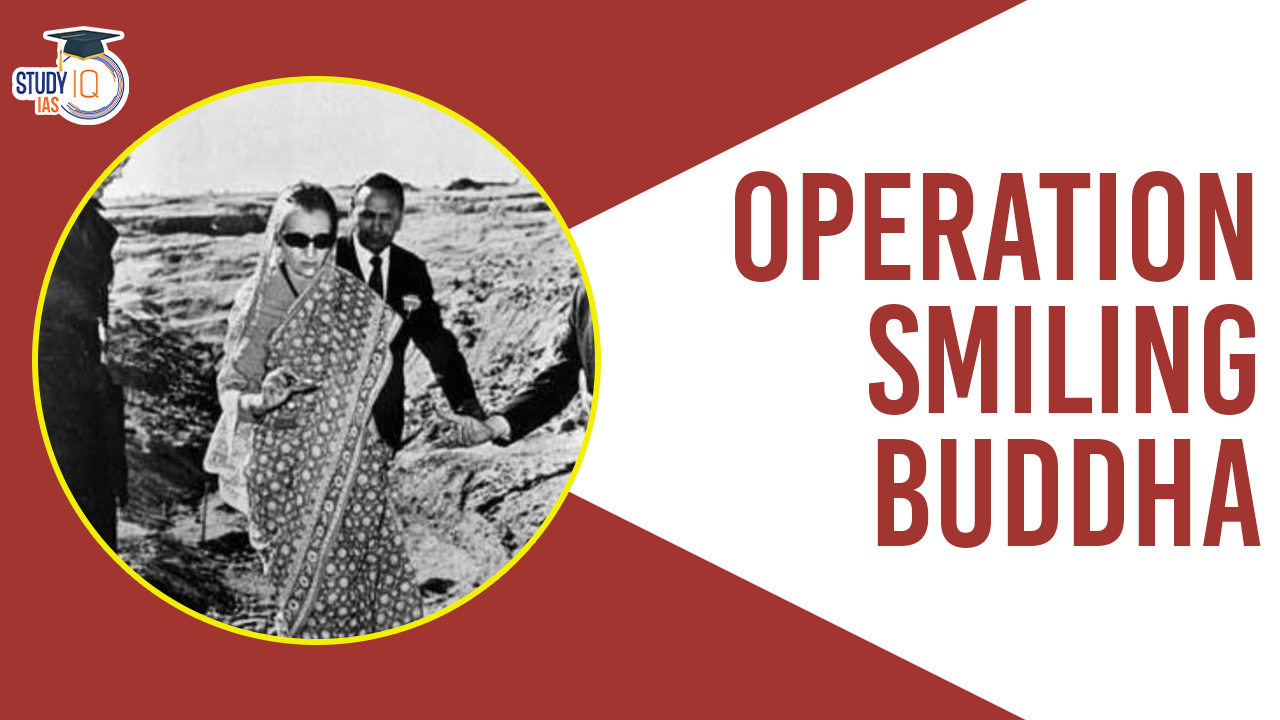Table of Contents
Operation Smiling Buddha was the code name for India’s first successful nuclear bomb test. The test was conducted on May 18, 1974, at the Pokhran Test Range in Rajasthan. The bomb was detonated by the Indian Army under the supervision of several key Indian generals.
Operation Smiling Buddha
On May 18, 1974, India made a historic and assertive move by conducting its first successful nuclear test under the code name “Operation Smiling Buddha.” This event marked a significant moment in India’s history, as it officially became a member of the exclusive group of nations possessing nuclear capabilities.
Background
Operation Smiling Buddha, conducted on May 18, 1974, at the Pokhran Test Range in Rajasthan, was India’s first successful nuclear test. This clandestine operation had a significant historical context. During the Cold War era, the global geopolitical landscape was dominated by the United States and the Soviet Union. India’s neighbouring countries, China and Pakistan, had already conducted their nuclear tests in 1964 and 1998, respectively. India felt compelled to ensure its own security, which led to the decision to carry out the nuclear test.
We’re now on WhatsApp. Click to Join
Operation Smiling Buddha Nuclear Test
The successful detonation of a nuclear device during Operation Smiling Buddha marked a significant achievement for India’s scientific community. The explosion, which had an estimated yield of 8-12 kilotons, demonstrated India’s nuclear capabilities. This event was a turning point in India’s quest for nuclear deterrence and marked its entry into the group of nuclear-armed nations.
Operation Smiling Buddha: Impact on India’s Security
- Deterrence: Operation Smiling Buddha served as a deterrent against potential adversaries, primarily Pakistan and China. It sent a clear message that India possessed the capability to defend itself in the event of a nuclear threat.
- Strategic autonomy: By becoming a nuclear-armed state, India reduced its dependence on external powers for its security needs and established its strategic autonomy.
- National pride: The successful nuclear test boosted India’s national pride and played a significant role in bolstering the confidence of its citizens.
Operation Smiling Buddha: Global Impact
Operation Smiling Buddha had far-reaching global repercussions:
- Non-Proliferation Treaty (NPT): India’s nuclear test challenged the NPT, which aimed to curb the spread of nuclear weapons. India’s status as a nuclear-armed nation without NPT membership stirred global debate on the treaty’s effectiveness.
- Sanctions: In response to Operation Smiling Buddha, several countries imposed economic sanctions on India, affecting its international trade and economic growth.
- Global diplomatic relations: The nuclear test strained India’s relations with many countries, but over time, diplomatic efforts led to improved ties with key nations, including the United States.
Operation Smiling Buddha an Analysis
“Operation Smiling Buddha” was a pivotal moment in India’s history, signifying its nuclear capabilities and altering the country’s security dynamics. The test was a manifestation of India’s determination to safeguard its sovereignty and maintain regional stability.
The impact on India’s security was significant. It not only served as a powerful deterrent but also allowed India to chart its own course in security matters. This newfound strategic autonomy was a testament to India’s desire to break free from the shackles of external influences.
On the global stage, the test raised important questions about the effectiveness of international non-proliferation efforts. India’s refusal to sign the NPT challenged the notion that nuclear disarmament was a universally accepted goal. This challenge to the NPT had long-lasting consequences, influencing international discourse on nuclear policy.
However, it’s essential to note that the test also had adverse repercussions in the form of economic sanctions and strained diplomatic relations. In time, diplomatic efforts contributed to the restoration of India’s relations with key nations, particularly the United States, leading to closer cooperation on various fronts.
In conclusion, “Operation Smiling Buddha” was a defining moment in India’s history, with profound implications for its security and the global non-proliferation regime. It exemplifies the complexities of security and diplomacy in a world where nuclear capabilities hold significant sway.
Operation Smiling Buddha UPSC
“Operation Smiling Buddha” was India’s first successful nuclear test conducted on May 18, 1974. In the backdrop of the Cold War and regional nuclear developments, India sought to enhance its security. This clandestine test marked a significant moment, demonstrating India’s nuclear capabilities and ushering it into the group of nuclear-armed nations. It bolstered India’s deterrence, reduced dependency on external powers, and fueled national pride.
Globally, the test challenged the Non-Proliferation Treaty, invited sanctions, and strained diplomatic ties. However, over time, diplomatic efforts led to improved relations with key nations, notably the United States, reshaping India’s global standing.


 Navy-Marine Expeditionary Ship Interdict...
Navy-Marine Expeditionary Ship Interdict...
 K2-18b Exoplanet: Potential Biosignature...
K2-18b Exoplanet: Potential Biosignature...
 Vehicle-to-Grid (V2G) Technology and its...
Vehicle-to-Grid (V2G) Technology and its...






















